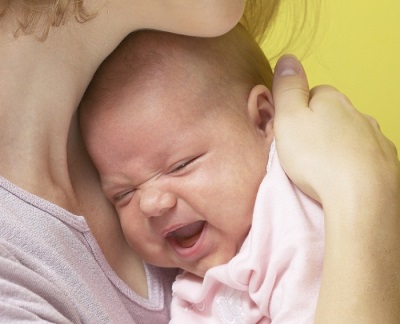What to do when hiccups in newborns and infants after feeding?
The appearance of hiccups in a child during the first months of life cannot be called a rare occurrence. For the first time, this symptom may occur even during the period of prenatal life, and it is associated primarily with the immaturity of the development of the nervous and digestive systems of the young. Most often, the newborn hiccups appear during feeding and after it. Why is this happening, is it dangerous and how to help the toddler?
The reasons
The functional immaturity of the digestive tract of a newborn baby, as well as feeding disturbances of the baby, leads to the appearance of hiccups after eating.
The provoking factors include:
- Fast feeding, in which the crumb swallows a lot of air.
- Breach of breastfeeding techniques.
- Excess milk from the mother when the baby does not have time to swallow it and the food arrives very quickly and in large quantities.
- Violations of the diet nursing mothers, the result of which will be increased gas formation.
- Wrong translation of the baby into the mixture.
- Incorrectly selected nipple.
- Laying the baby immediately after feeding (the air that the baby swallowed remained in the stomach).
- Intestinal colic.
In some cases, hiccups after eating, especially if it does not stop for a long time and is not the only alarming symptom, may indicate the pathology of the toxins of the digestive tract, for example, esophageal disease. Much less often, hiccups appear when the central nervous system is affected, for example, during birth trauma or abnormal brain development.
In addition, this symptom appears during intoxication and infections affecting the brain. In this case, hiccups are not the only manifestation, but will be accompanied by a rise in temperature, a decrease in the weight of the child, lethargy, apathy, regurgitation, constant crying and other symptoms.
What to do?
Episodic attacks of hiccups, which appear for a few minutes, do not need to be treated. If you see that hiccups cause the baby inconvenience or prevent the baby from falling asleep, you can distract the toddler, for example:
- Give a warm drink - attach to the chest, give a little mixture or warm water.
- Attach something warm to the tummy - a heating pad or a heated diaper.
- Hold baby post and wait for belching.
With frequent attacks of hiccups, very long hiccups (longer than an hour) or other adverse symptoms, show the baby to the doctor.
Prevention
If the appearance of hiccups led to a violation of the baby's diet, it is important to prevent the appearance of such a symptom in the future. To do this:
- Feed the baby so that its head and chest are located slightly above the lower part of the body.
- Some time after feeding, wait for the regurgitation of air and excess milk, and only then lay on a horizontal surface.
- To feed the toddler in a relaxed atmosphere, without waiting for too much hunger, so that the tot will not eat too “greedily”.
- When feeding the mixture to give food in small quantities, as well as pay attention to the size of the hole in the nipple.
- When feeding with breast milk and colic, exclude gassing products from the mother's menu, for example, cabbage and legumes.
Opinion E. Komarovsky
A popular doctor confirms that most often in newborns and babies, hiccups are provoked by overeating and quick ingestion of milk. In addition, he draws attention to the fact that the cause of this symptom is often the drying of the mucous membranes, so mothers need to make sure that the crumb is in comfortable conditions (the air is sufficiently moistened).
For more on this, see the transfer of Dr. Komarovsky.












